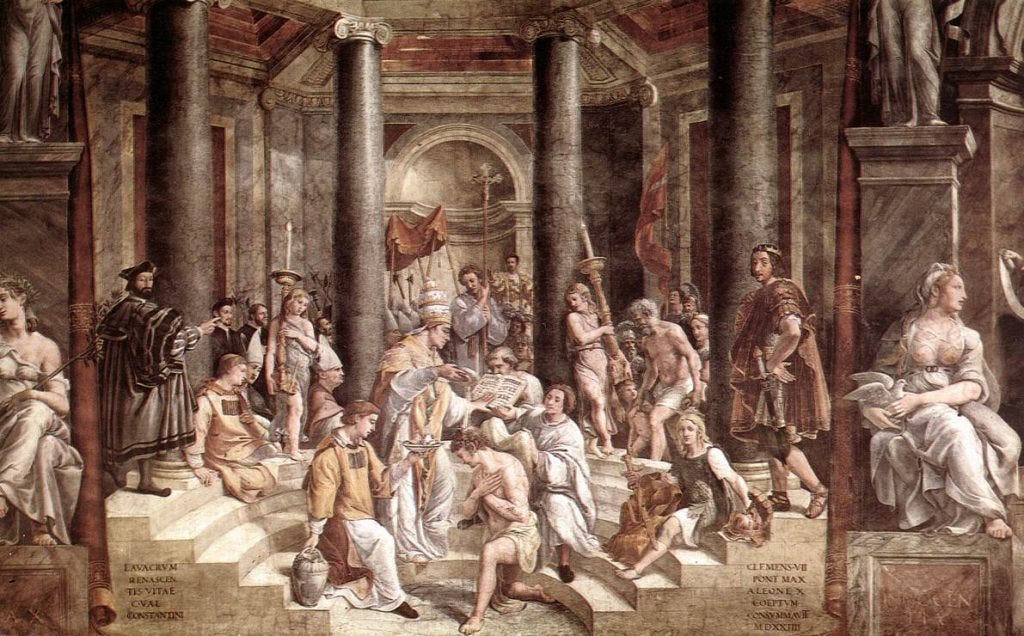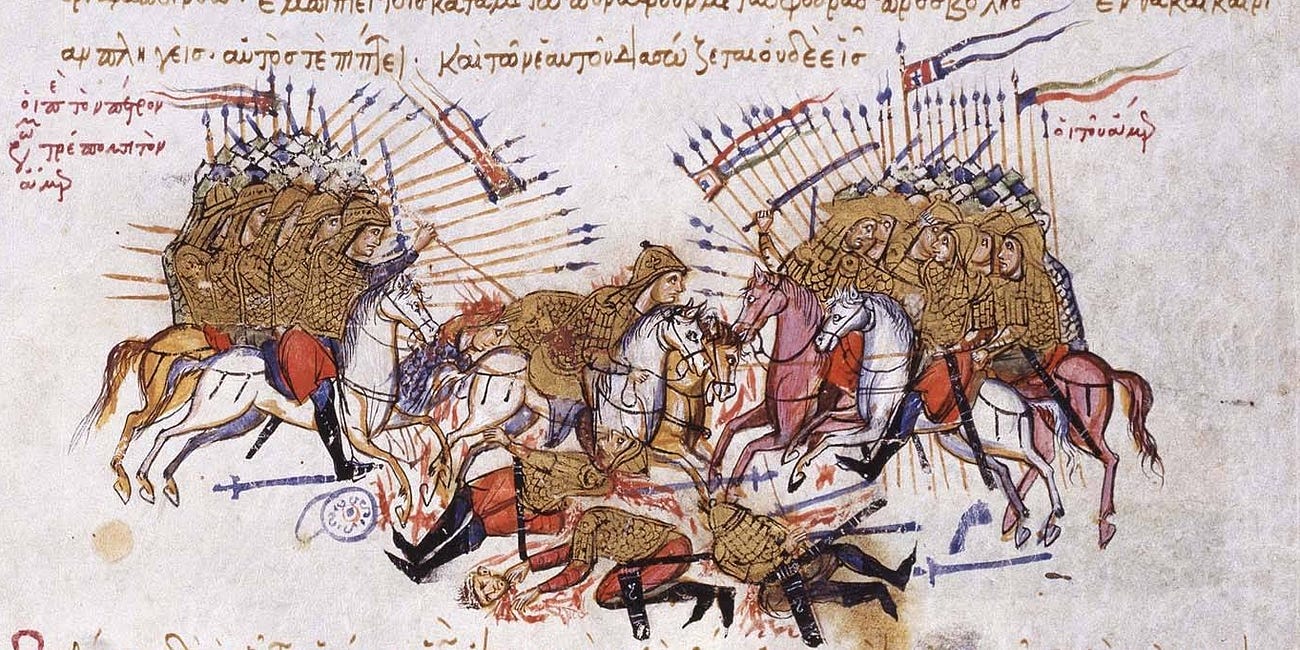I have long wanted to understand how – and why, from a secular perspective – Christianity spread throughout the Roman Empire and society, eventually coming to dominate them in a way that paganism never did.
Before Christianity, paganism was defined as things “rustic”, of the countryside. It did not refer to an organized religion or even a set of beliefs. Only around 4th century did it come to be assigned to people who were not committed through baptism to be a “soldier of Christ”.
So far as pagan “religion” went, according to Fox, it was an extremely eclectic collection of rituals, cults, supernatural beliefs, magic, and philosophies that had argued themselves into a metaphysical “stalemate”. These were as varied as local languages and cultures. Adherents and practitioners did not subscribe to revealed belief systems, made no evangelical exhortations to faith, and were unaccustomed to notions of heresy. Instead, it was simply something in the backdrop or milieu that people did: a combination of festivals, gestures to appease (or demand favor from) incomprehensible gods, even dream states that explained occurrences or personal luck. In addition, it was syncretic, absorbing gods and practices no matter what their origin into a polytheistic pantheon and ritual, many temples or shrines indiscriminately offering a multiplicity of possibilities for worship or action. Even the Roman Emperor became a God – his behavior as an agent of unpredictable power or beneficence reflected similar behavior in the Olympian gods.
In a socio-political sense, local notables were responsible for bankrolling pagan festivals, buildings, and feasts. Participating in the local religion was a sign of fealty to them, to the city or polis, and more largely, to the empire, that is, pagan practices and beliefs represented an acknowledgement of one's place in the hierarchy. All the notables required was a gesture of fealty or participation – it mattered little what people really thought or felt, they just needed to swear allegiance or even simply partake of the food and drink on offer at a gathering – that reinforced the notables' control, prestige, and support. (It was here that the Christians, who refused to make these gestures of fealty, first ran awry of the pagan state, setting themselves apart from the 1st century.)
In contrast, Fox observes, Christianity offered clearly expressed doctrines, definitive philosophical answers, and orthodoxy that required or professed a commitment of faith. In a sense, Christians were not adherents, but converts, brought in by evangelicalism, conviction, and persuasion. In place of the concatenation of contradictory beliefs and pagan practices, it offered certainty of a knowledge of God, a narrative of redemption and brotherly love, and a personal and individual program – to eliminate sin – that led to eternal life. While its ideas were simple enough to be understood by anyone, they were ripe for refinement and ever-unfolding complexity. This was aided by the fact that Christianity was a “written religion” and not an oral one like classical polytheism. Christianity united ritual and philosophy, answering questions that pagans could not with such confidence that Christians were willing to die under horrible circumstances to advance their faith and enter paradise. This impressed many pagans.
There were a number of new elements in Christianity. First, it offered an image of community rather than the hardened hierarchy of pagan societies: love, equality, and brotherhood were supposed to draw one to the faith, all as “equals”. The hierarchy existed in heaven, where angels followed God, then the saints, then holy men, and finally the righteous. Second, they were exhorted to love even their enemies. Third, humility was seen as good rather than a disdained, unheroic sentiment for the weak or enslaved. Fourth, Satan could explain evil as an act of will rather than fate, chance occurrence, or bad fortune; the pagan gods with their inexplicable caprices were often incorporated into his demonology. Fifth, there was the notion of sin, which could manifest itself in behavior and conduct but also purely in thought; punishment for it could be eternal. Sixth, women and men were not segregated, but worshiped together.
Politically, these differences threatened to serve as a state within a state, which the authorities could not fully control. Christianity, in this scheme, was a direct assault on social barriers and distinctions as well as allegiance to the state. Christians could also deny the material world, adopting certain habits (celibacy, asceticism, withdrawal as hermits) that, in emulation of angels, emphasized the paramount importance of the next world rather than any obligations of service in the present one. In the case of the elite, this was a violation of traditional obligation to the state, for example contradicting the cursus honorum that governed their career obligations. Finally, with its orthodoxy and “heresy”, Christianity undermined the rule of Roman law that governed individual responsibility, replacing it with collective belief system that effected entire families and even whole communities. No wonder Roman authorities opposed it!
Of course, there were many overlapping practices of both religions, from praise of virginity and chastity, visions of Gods and demons, prophesies, and prayers seeking favor from the supernatural. As it evolved, Christianity picked and chose which practices it would incorporate and apply systematically.
The book offers a great deal of historical context. An important factor was the increasing instability of life in the late Roman Empire. As the state lost its ability to defend and feed them, citizens were scared and wanted more certainty. Moreover, paganism was “decadent”, unable to offer answers as convincing and apparently irrefutable as Christians could do. Finally, as Constantine embraced Christianity to win a civil war, the power of paganism to appease the gods was “disproven” once and for all. With the Emperor a Christian, it became socially acceptable then fashionable to convert. (Unfortunately, I found none of the emperor-dependent explanations of the eventual ascendency of Christianity sufficient.)
I cannot do justice to the density and insight that this book has. However, in between wonderfully lucid explanations, the reading experience can be a slog. While well written, its academic method is probably too much for all but the most committed reader. Finally, the book is not for beginners: the reader must know the history of late antiquity as well as the rudiments of both classical polytheism and Christianity; otherwise, it would be very difficult to plow through. It is written at the mature undergraduate or even graduate level.
This book offers a brilliant exposition of the natures of the forms of religion, polytheism and monotheism during the Roman Empire, highlighting their similarities and differences. That makes it a must-read for anyone interested in late antiquity. If sometimes overly detailed and pedantic, this book consistently fascinates.
Related reviews:
Splendidly incisive essay on the eclipse of classical culture
This is one of those history books that defines the era, setting a standard that is either accepted or opposed by all who follow. Because the end of the classical culture is one of the turning points that most fascinates me, this book was a particular pleasure, at once an over-arching synthesis yet accurate in its evocation of detail.
How Roman Emperors used Christianity to enhance their power
The title of this book made me fear it was a New Atheist screed that would blame everything on Christianity. This is a disservice. After long hesitating to pick it up, I was delighted to find a detailed and profound inquiry into one of the most significant periods in western history, i.e. how Christianity triumphed over previous religions and what it me…
How God has shown the way, particularly when the needs of our society change
Robert Wright likes to take on the big questions. In this book, he looks at God, or rather, how God has evolved in the minds (and political institutions) of men. There are a few basic ideas he wants to get across. First, he explores how the conception of God – as wrathful and intolerant or as promoting universal brotherhood, etc. – evolved in response t…








